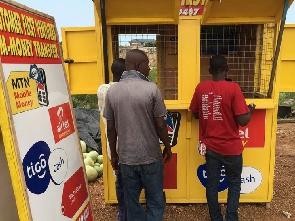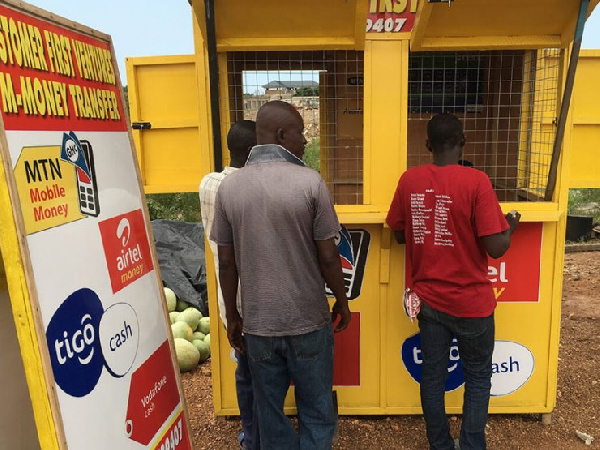 A photo of MoMo agent serving customers
A photo of MoMo agent serving customers
The mobile money revolution has turned from an experiment into the backbone of Ghana’s financial system, with transactions surging to GH¢3.02trillion in 2024 and more than 24 million active users – a transformation the Bank of Ghana (BoG) says is redefining how the economy moves, pays and saves.
Speaking at the MOBEX Africa Tech Expo and Innovation Conference 2025 opening session in Accra, Second Deputy Governor of BoG, Matilda Asante-Asiedu said mobile money now accounts for half of all formal payment flows, marking a decade-long leap from GH¢266million in transactions for 2015.
She said Ghana’s payment system has evolved into a digital-first infrastructure that connects homes, merchants and small businesses nationwide, while new regional systems like the Pan-African Payments and Settlement System (PAPSS) signal a shift toward sovereign and inclusive digital finance.
“PAPSS now links 150+ banks and several central banks and plans are underway for an ‘African Currency Marketplace’ to settle transactions in local currencies and reduce reliance on foreign-exchange bridges.”
She noted that with billions of cedis flowing through electronic channels, Ghana now has the infrastructure to deliver financial services at a scale that seemed impossible just a decade ago.
But she cautioned that scaling this progress demands equal focus on security, trust and inclusion, especially for women and rural communities still left on the digital economy’s margins.
“According to the Alliance for Financial Inclusion, formal account ownership among women in Ghana has nearly doubled over the past decade but account usage remains patchy. Having an account is not the same as using it confidently, safely and productively,” she stated.
Sustainable mining is the future – MIFF CEO
It is in line with this that she stressed: “Building for equity must therefore be intentional. We must design digital solutions mindful of gender and rural inclusion, offering access to those who live and trade outside the formal banking system. That is how inclusion stops being a slogan and becomes a living reality.”
Delivering a keynote address on behalf of the BoG Governor, Asante-Asiedu said the central bank is pursuing a three-part agenda built on practical reforms.
The priorities include strengthening instant payment systems, achieving full wallet-bank interoperability, improving agent network quality and tightening complaint-handling procedures to protect consumers.
She said policy stability remains essential to sustaining momentum, urging continuous integration of digital IDs, better data governance and migration of public-sector payments onto instant platforms. These, she added, will enhance transparency, trust and interoperability across the financial system.
The Deputy Governor urged banks and payment service providers to prioritise accessibility over margins, stressing the importance of fair pricing, platform reliability and deeper engagement with small-and medium-sized enterprises.
She also called on telecom operators and fintechs to design intuitive services in local languages with inbuilt fraud awareness and for universities and development partners to fund digital literacy and inclusion models that create lasting behavioural change.
The 2025 MOBEX Africa Tech Expo and Innovation Conference, themed ‘Resetting Africa’s Digital Identity and Sovereignty’, brought together policymakers, innovators and investors.
The MOBEX Africa Chief Executive Officer (CEO), George Spencer Quaye, said this theme reflects Africa’s need to recalibrate its digital development model.
“Africa has made great strides, but this is a moment to reclaim our digital momentum,” Quaye said. “For too long, we have been the testing ground, not the power behind innovation. That era is ending. We will no longer only adopt, we will create. We will no longer depend, we will own.”
The Minister of Foreign Affairs and Regional Integration, Samuel Okudzeto, said the conference’s theme resonates deeply with the work of foreign ministries across the continent.
“This is because sovereignty in the 21st century is not just about territorial integrity and political independence. It is also about digital autonomy, technological capacity and the ability to shape our own digital futures.”
He said Ghana’s foreign policy recognises that building Africa’s digital future requires strategic international partnerships – but partnerships on equal terms, partnerships that build our capacity rather than creating new dependencies.
“We are cultivating relationships with countries and blocs that bring technology, investment and expertise while respecting African sovereignty and supporting African priorities,” he added.
Margins ID Group Deputy CEO, Kwesi Baiden Jr., added that unlocking Ghana’s digital identity infrastructure will require consistent enforcement and alignment among state institutions.
Watch the latest edition of BizTech below:
